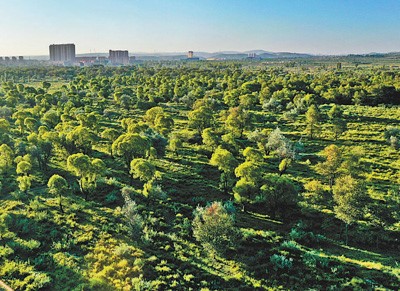

Thanks to generations of efforts in taming desertification, people in Yulin, northwest China’s Shaanxi province, have turned the Mu Us Desert, one of the four major deserts in the country, into an oasis.

Photo taken on August 16, 2019 shows a wetland park in Jingbian county, Yulin, northwest China’s Shaanxi province. (Photo by Tao Ming/Xinhua)
As of today, the forest coverage rate of the city has increased from 0.9 percent in 1949 to 34.8 percent. Meanwhile, 93.2 percent of the desertified land in Yulin is now under control, extending the green part of Shaanxi 400 kilometers northward.
Planting trees is the key to the ecological miracle in the city. In 1974, 54 young girls with an average age of 18 in Yulin responded to the country’s call for afforestation and formed a desertification control company.
Xi Yongcui, now 64 years old, is one of the first-generation members of the company, who spent eight years on the team pursing the mission of the group. After getting married at the age of 26, her husband became a tractor driver for the company. Now Xi Cai’e, the couple’s post-90s grandniece, is the current commander of the desertification control company.
Over the past 46 years, militiawomen of the company removed more than 800 dunes, built 30 windbreak and sand fixation forest belts and 35 kilometers of water channels, turning about 961.7 hectares of the sandy land into green land.
Because of people like these militiawomen, about 573,333 hectares of the desert sand in Yulin has been transformed. In November 2019, Yulin received an award with the title of a state-level forest city by the National Forestry and Grassland Administration.
The miracle is also attributable to science and technology. In 2002, Zhang Yinglong, an executive of a foreign company in Beijing at the time, returned to his hometown Shenmu, the northernmost city in Yulin, to obtain 28,533 hectares of sandy land in the Mu Us Desert by contract.
Relying on the role of science and technology from the very outset, he has become a sand control expert under the influence of Shao Mingan, an academician of the Chinese Academy of Sciences (CAS).
Zhang has also worked together with the CAS’s Institute of Geographic Sciences and Natural Resources Research, the Chinese Academy of Forestry, the Chinese Academy of Agricultural Sciences, and foreign research institutes for afforestation of the land he had contracted.
After years of hard work, Zhang has restored the sandy land, turning it into forests, meadows, and fertile land.
 Fire brigade in Shanghai holds group wedding
Fire brigade in Shanghai holds group wedding Tourists enjoy ice sculptures in Datan Town, north China
Tourists enjoy ice sculptures in Datan Town, north China Sunset scenery of Dayan Pagoda in Xi'an
Sunset scenery of Dayan Pagoda in Xi'an Tourists have fun at scenic spot in Nanlong Town, NW China
Tourists have fun at scenic spot in Nanlong Town, NW China Harbin attracts tourists by making best use of ice in winter
Harbin attracts tourists by making best use of ice in winter In pics: FIS Alpine Ski Women's World Cup Slalom
In pics: FIS Alpine Ski Women's World Cup Slalom Black-necked cranes rest at reservoir in Lhunzhub County, Lhasa
Black-necked cranes rest at reservoir in Lhunzhub County, Lhasa China's FAST telescope will be available to foreign scientists in April
China's FAST telescope will be available to foreign scientists in April "She power" plays indispensable role in poverty alleviation
"She power" plays indispensable role in poverty alleviation Top 10 world news events of People's Daily in 2020
Top 10 world news events of People's Daily in 2020 Top 10 China news events of People's Daily in 2020
Top 10 China news events of People's Daily in 2020 Top 10 media buzzwords of 2020
Top 10 media buzzwords of 2020 Year-ender:10 major tourism stories of 2020
Year-ender:10 major tourism stories of 2020 No interference in Venezuelan issues
No interference in Venezuelan issues
 Biz prepares for trade spat
Biz prepares for trade spat
 Broadcasting Continent
Broadcasting Continent Australia wins Chinese CEOs as US loses
Australia wins Chinese CEOs as US loses